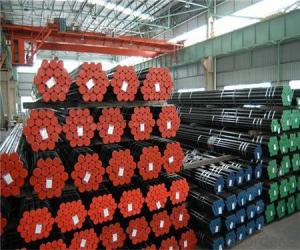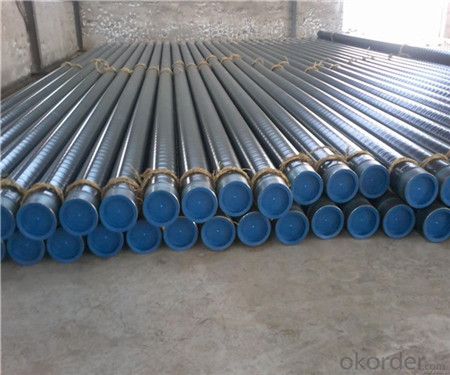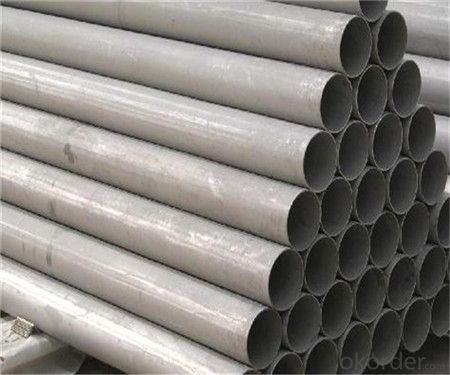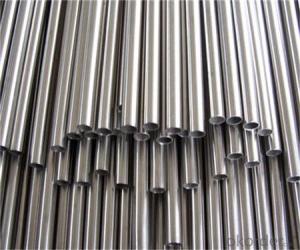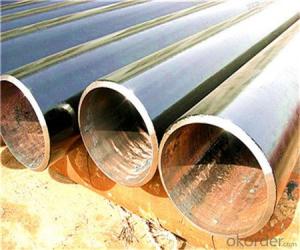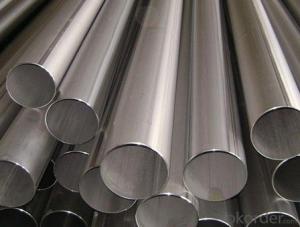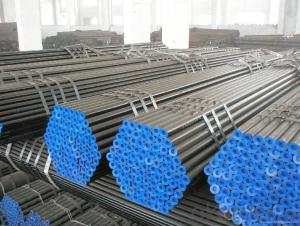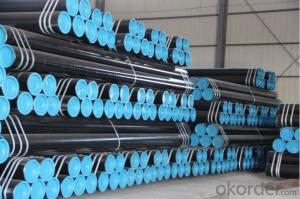Seamless Steel Pipe with API 5L-0733/A106/A53 from CNBM
- Loading Port:
- Tianjin
- Payment Terms:
- TT OR LC
- Min Order Qty:
- 25 m.t.
- Supply Capability:
- 200000 m.t./month
OKorder Service Pledge
OKorder Financial Service
You Might Also Like
1、Structure of API 5L-0733/A106/A53 Pipe:
Seamless pipe is formed by drawing a solid billet over a piercing rod to create the hollow shell. As the manufacturing process does not include any welding, seamless pipes are perceived to be stronger and more reliable. Historically seamless pipe was regarded as withstanding pressure better than other types, and was often more easily available than welded pipe.
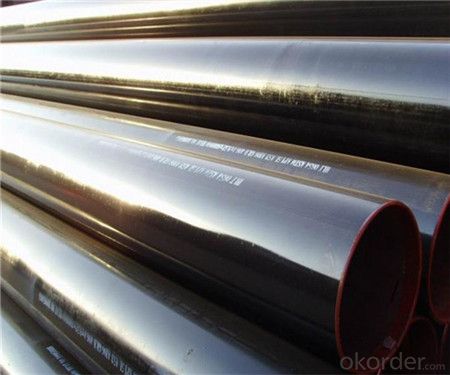
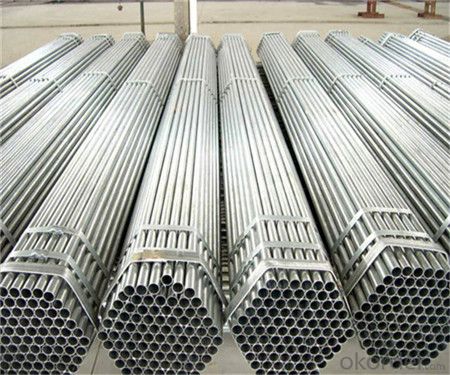
2、API 5L-0733/A106/A53 Pipe Specification:
Standard | GB, DIN, ASTM ASTM A106-2006, ASTM A53-2007 |
Grade | 10#-45#, 16Mn 10#, 20#, 45#, 16Mn |
Thickness | 8 - 33 mm |
Section Shape | Round |
Outer Diameter | 133 - 219 mm |
Place of Origin | Shandong, China (Mainland) |
Secondary Or Not | Non-secondary |
Application | Hydraulic Pipe |
Technique | Cold Drawn |
Certification | API |
Surface Treatment | factory state or painted black |
Special Pipe | API Pipe |
Alloy Or Not | Non-alloy |
Length | 5-12M |
Outer Diameter | 21.3-610mm |
Grade | 20#, 45#, Q345, API J55, API K55, API L80, API N80, API P110, A53B |
Standard | ASME, ASTM |
1) Material:20#(ASTM A 106/A53 GRB.API5LGRB,GB),45#,16Mn,10#.
2) Specification range:OD:21.3-610mm,WT:6-70mm,length:6-12m or according to the requirement of clients.
3) Excutive standards:GB,ASME API5L.ASTM A 106/A53,Despite of the above standards,we can also supply seamless steel pipe with standard of DIN,JIS,and so on,and also develop new products according to the requirements of our clients!
4) Surface:black lacquered,varnish coating or galvanized.
5) Ends:Beveled or square cut,plastic capped,painted.
6) Packing:bundles wrapped with strong steel strip,seaworthy packing.
3、Main Features of API 5L-0733/A106/A53 Pipe::
• High manufacturing accuracy
• High strength
• Small inertia resistance
• Strong heat dissipation ability
• Good visual effect
• Reasonable price
4、Packaging & Delivery
Packaging Details: | seaworthy package,bundles wrapped with strong steel strip |
Delivery Detail: | 15-30days after received 30%TT |
5、FAQ of API 5L-0733/A106/A53 Pipe::
①How is the quality of your products?
Our products are manufactured strictly according to national and internaional standard, and we take a test
on every pipe before delivered out. If you want see our quality certifications and all kinds of testing report, please just ask us for it.
Guaranteed: If products’ quality don’t accord to discription as we give or the promise before you place order, we promise 100% refund.
②How about price?
Yes, we are factory and be able to give you lowest price below market one, and we have a policy that “ for saving time and absolutely honest business attitude, we quote as lowest as possible for any customer, and discount can be given according to quantity”,if you like bargain and factory price is not low enough as you think, just don’t waste your time.Please trust the quotation we would give you, it is professional one.
③Why should you chose us?
Chose happens because of quality, then price, We can give you both.Additionally, we can also offer professional products inquiry, products knowledge train(for agents), smooth goods delivery, exellent customer solution proposals.Our service formula: good quality+good price+good service=customer’s trust
SGS test is available, customer inspection before shipping is welcome, third party inspection is no problem.
- Q: Seamed steel pipe seamless steel pipe, carbon steel pipe, galvanized pipe, four how to distinguish between
- Major use differentiation:1, seamed tube can withstand the maximum operating pressure is generally less than 20 kg, which is the most secure use. It is generally used in water, gas, compressed air and other low-pressure fluid;2 seamless tube can withstand ultra-high pressure, of course, its wall thickness will also increase, which needs to be designed according to pressure requirements. It is generally used in high-pressure oil pipes, boiler tubes and other high temperature and high pressure equipment. There are also seamless tubes for structural purposes, depending on the design requirements.3, there are some seamed steel pipe seamless treatment tube, it is the weld annealing treatment, eliminate the residual stress of the weld, the weld and base material, the pressure range of basic and seamless pipe is. May also consider the use of.4, of course, the market also has some use overall heating after drawing steel pipe joints or mandrel rolling seamless steel pipe, mainly in small size, only in the shape of this kind of pipe belongs to the seamless tube, it is not very good
- Q: What is the difference between steel pipes and PVC-M pipes?
- The main difference between steel pipes and PVC-M pipes lies in their material composition. Steel pipes are made of steel, which gives them higher strength and durability. They are commonly used for high-pressure applications and in areas where the pipes may be exposed to extreme conditions or corrosive substances. On the other hand, PVC-M pipes are made of polyvinyl chloride modified with certain additives to enhance their impact resistance and toughness. They are lightweight, easy to install, and resistant to corrosion, making them suitable for various applications, including water supply, irrigation, and drainage systems. While steel pipes offer superior strength, they are more expensive and require regular maintenance, such as anti-corrosion treatments. PVC-M pipes, on the other hand, are more affordable, require minimal maintenance, and can be easily joined using solvent welding or mechanical fittings. In summary, the choice between steel pipes and PVC-M pipes depends on factors such as the intended use, budget, and environmental conditions.
- Q: How are steel pipes used in the manufacturing of chemical storage tanks?
- Steel pipes are commonly used in the manufacturing of chemical storage tanks as they provide structural support and serve as conduits for the transportation of chemicals. These pipes are typically used for connecting various components of the tank, such as the inlet and outlet valves, as well as for creating the internal plumbing system. The durability and corrosion resistance of steel make it an ideal material for ensuring the integrity and longevity of chemical storage tanks.
- Q: Are steel pipes suitable for hydronic heating systems?
- Yes, steel pipes are suitable for hydronic heating systems. Steel pipes are known for their durability and strength, making them a reliable choice for transporting hot water or steam in a hydronic heating system. They can withstand high temperatures and pressures, ensuring efficient heat transfer throughout the system. Additionally, steel pipes are resistant to corrosion, which is important in preventing leaks or damage to the pipes over time. However, it is essential to properly insulate steel pipes to minimize heat loss and improve energy efficiency in the hydronic heating system. Overall, steel pipes are a popular and suitable option for hydronic heating systems due to their reliability, durability, and ability to handle the demands of heating water or steam.
- Q: What is an electric welded pipe (EFW)? Seek help!
- According to the operation requirements of the electric welding machine, connect the lead wire and set up the proper welding parameter of the electric welding machine, which can be operated by manual or automatic two input methods.After checking, start the electric welding machine and enter the welding process. When the welding time is reached, the machine will automatically enter the cooling state.When the pipe completely removed after cooling, electric fusion welding machine.Cutting the pipe with the cutting tool of plastic pipe or fine toothed saw with cutting guide device, and making its end face perpendicular to the axis of pipe. Remove the edges of the edges with a knife, scrape the weld area in the pipe or spigot end and clean the weld area.Should use the special fixture as far as possible to secure the components to be connected, and the roundness of the pipe shall not exceed 1.5% of the outer diameter of the pipe, or it should be corrected on the corresponding fixture.
- Q: How do you prevent corrosion in steel pipes?
- One effective way to prevent corrosion in steel pipes is by applying a protective coating, such as paint or epoxy, to the surface of the pipes. This barrier creates a physical barrier between the pipe and the surrounding environment, preventing moisture and corrosive agents from coming into direct contact with the steel. Additionally, regular inspection and maintenance of the pipes, including cleaning and repairing any damaged coating, can help identify and address potential issues before they lead to corrosion.
- Q: How do you calculate the pressure drop in a steel pipe?
- When determining the pressure decrease in a steel pipe, various factors need to be taken into account. These factors include the pipe's diameter and length, the fluid's flow rate, and the fluid's properties. One commonly utilized equation for calculating the pressure drop in a pipe is the Darcy-Weisbach equation. This equation is as follows: ΔP = (f * (L / D) * (ρ * V^2)) / (2 * D) In this equation: - ΔP represents the pressure drop in the pipe - f denotes the Darcy friction factor, which relies on the pipe's roughness and Reynolds number - L refers to the pipe's length - D represents the pipe's diameter - ρ signifies the fluid's density - V indicates the fluid's velocity To compute the Darcy friction factor, different methods can be employed depending on the flow regime. For laminar flow, the formula f = 16 / Re can be utilized, where Re represents the Reynolds number. For turbulent flow, the friction factor can be determined using various methods, such as the Colebrook equation or the Moody chart. It should be noted that the fluid's properties, such as viscosity and density, may vary with temperature and pressure. Thus, considering these variations is crucial when calculating the pressure drop. Moreover, it is important to acknowledge that additional factors, including fittings, valves, and elbows, can impact the pressure drop in a steel pipe. These factors introduce extra losses, which can be accounted for by employing appropriate correction factors or directly measuring the pressure drop across these components. Overall, calculating the pressure drop in a steel pipe necessitates the use of suitable equations, taking into account the fluid's properties, and considering the various factors that can influence the flow. It is advisable to consult relevant engineering handbooks or employ specialized software for accurate calculations.
- Q: How do you calculate the pipe buoyancy for steel pipes in water?
- To calculate the pipe buoyancy for steel pipes in water, you need to consider the weight of the water displaced by the submerged portion of the pipe. This can be done using Archimedes' principle, which states that the buoyant force on an object immersed in a fluid is equal to the weight of the fluid displaced by the object. First, calculate the volume of the submerged portion of the pipe. This can be done by multiplying the cross-sectional area of the pipe by the length of the submerged portion. Next, determine the density of the water in which the pipe is submerged. Typically, this value is around 1000 kg/m³ for freshwater and slightly higher for seawater. Multiply the volume of the submerged portion of the pipe by the density of the water to find the weight of the water displaced. Finally, compare the weight of the water displaced to the weight of the steel pipe. If the weight of the water displaced is greater than the weight of the pipe, the pipe will be buoyant and tend to float. If the weight of the pipe is greater, it will sink. It's important to note that other factors such as pipe design, wall thickness, and external forces acting on the pipe may also influence its buoyancy. Therefore, it's recommended to consult industry-specific guidelines or seek expert advice for accurate calculations in specific scenarios.
- Q: How are steel pipes used in the construction of tunnels?
- Steel pipes are used in the construction of tunnels for various purposes such as drainage, ventilation, and transportation of utilities. They provide structural support, ensuring stability and strength, while also allowing for the efficient flow of water, air, and other essential resources within the tunnel.
- Q: What is the difference between steel pipe and PVC conduit?
- Steel pipe is a rigid and durable material commonly used for plumbing and industrial applications. It is made of steel, which provides strength and resistance to high pressure and temperature. On the other hand, PVC conduit is a type of plastic piping that is flexible, lightweight, and non-conductive. It is primarily used for electrical installations, as it offers protection and insulation to the wires. The main difference between steel pipe and PVC conduit lies in their composition, rigidity, and purpose of use.
Send your message to us
Seamless Steel Pipe with API 5L-0733/A106/A53 from CNBM
- Loading Port:
- Tianjin
- Payment Terms:
- TT OR LC
- Min Order Qty:
- 25 m.t.
- Supply Capability:
- 200000 m.t./month
OKorder Service Pledge
OKorder Financial Service
Similar products
Hot products
Hot Searches
Related keywords
